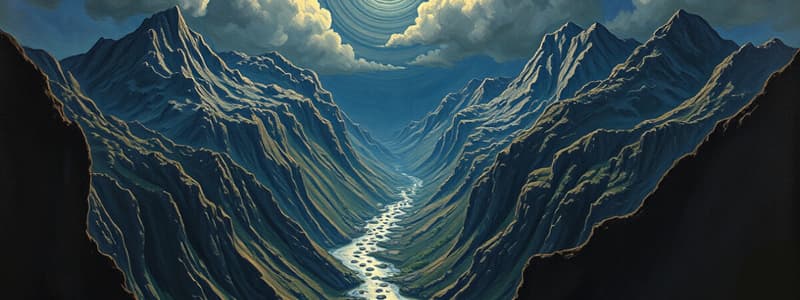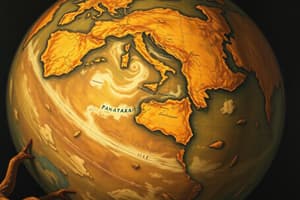Podcast
Questions and Answers
What is the name of the tectonic plate located in North America?
What is the name of the tectonic plate located in North America?
- North American Plate (correct)
- Eurasian Plate
- South American Plate
- African Plate
What is the name of the tectonic plate that covers South America?
What is the name of the tectonic plate that covers South America?
- Pacific Plate
- North American Plate
- South American Plate (correct)
- Eurasian Plate
What tectonic plate is found over Eurasia?
What tectonic plate is found over Eurasia?
- Indo-Australian Plate
- African Plate
- Eurasian Plate (correct)
- Pacific Plate
Which tectonic plate is associated with Africa?
Which tectonic plate is associated with Africa?
What is the name of the tectonic plate that includes India and Australia?
What is the name of the tectonic plate that includes India and Australia?
What is the tectonic plate situated underneath the Pacific Ocean?
What is the tectonic plate situated underneath the Pacific Ocean?
Which tectonic plate is found in the Antarctic region?
Which tectonic plate is found in the Antarctic region?
What type of boundary occurs when two tectonic plates collide?
What type of boundary occurs when two tectonic plates collide?
What type of boundary is formed when two tectonic plates move away from each other?
What type of boundary is formed when two tectonic plates move away from each other?
What is the boundary called where tectonic plates slide past each other horizontally?
What is the boundary called where tectonic plates slide past each other horizontally?
_____ and _____ are features found at an ocean to continent convergent boundary.
_____ and _____ are features found at an ocean to continent convergent boundary.
______ are features at convergent plate boundaries (subduction zones) and are the lowest part of the ocean floor.
______ are features at convergent plate boundaries (subduction zones) and are the lowest part of the ocean floor.
_____ is a feature at a divergent plate boundary. The process by which molten material adds new oceanic crust to the ocean floor.
_____ is a feature at a divergent plate boundary. The process by which molten material adds new oceanic crust to the ocean floor.
____ are a feature at continental-continental convergent boundaries.
____ are a feature at continental-continental convergent boundaries.
____ are a feature at transform boundaries where the plates slide past each other.
____ are a feature at transform boundaries where the plates slide past each other.
Flashcards are hidden until you start studying
Study Notes
Major Tectonic Plates
- North American Plate: Large tectonic plate covering North America and parts of the Atlantic Ocean.
- South American Plate: Plate situated beneath South America, extending into the Atlantic Ocean.
- Eurasian Plate: Enormous plate encompassing Europe and Asia, marking significant geological features.
- African Plate: Tectonic plate that includes the continent of Africa and surrounding oceanic regions.
- Indo-Australian Plate: Combines both the Indian and Australian tectonic plates, affecting regional geology.
- Pacific Plate: The largest tectonic plate, located beneath the Pacific Ocean, known for its seismic activity.
- Antarctic Plate: Covers Antarctica and the surrounding ocean floor, playing a role in global tectonics.
Types of Tectonic Boundaries
- Convergent Boundary: Plates collide, leading to mountain formation, earthquakes, and volcanic activity.
- Divergent Boundary: Plates move apart, creating new crust through sea-floor spreading.
- Transform Boundary: Plates slide horizontally past each other, resulting in faults and earthquakes.
Geological Features
- Volcanoes and Earthquakes: Common at ocean-to-continent convergent boundaries; often linked by geological processes.
- Trenches: Deep features formed at convergent plate boundaries (subduction zones), the lowest parts of the ocean floor.
- Sea-floor Spreading: Occurs at divergent plate boundaries, where molten material creates new oceanic crust.
- Mountains: Formed at continental-continental convergent boundaries, indicating significant uplift due to tectonic forces.
- Faults: Geological features at transform boundaries, where tectonic plates slide past each other horizontally, often leading to seismic activity.
Studying That Suits You
Use AI to generate personalized quizzes and flashcards to suit your learning preferences.




